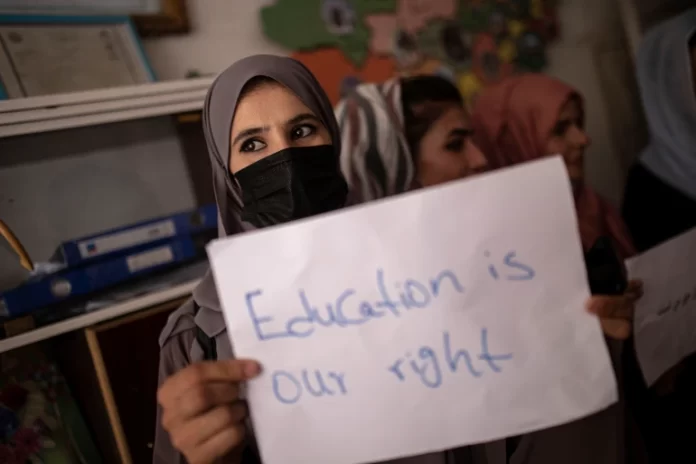
Senior member of Afghanistan’s Taliban-run government urges rulers to reopen secondary schools for girls, saying ‘women must get education’.
A senior member of the Taliban-run government in Afghanistan has called on the country’s new rulers to reopen schools for girls beyond the sixth year, saying there is no valid reason in Islam for the ban.
The appeal from Taliban Deputy Minister of Foreign Affairs Sher Mohammad Abbas Stanikzai on Tuesday came during a Taliban gathering in Kabul. It was a rare moderate voice amid the harsh measures imposed by the Taliban since they overran the country and seized power in August 2021.
Since returning to power, the Taliban has shut down girls’ secondary schools across the country, ordered women to wear hijabs in the workplace and to cover their faces in public, and has banned women from travelling long distances without a close male relative.
The Taliban have said they are working on a plan to open secondary schools for girls but have not given a timeframe.
The United Nations has called the ban “shameful” and the international community has been wary of officially recognising the Taliban, fearing a return to the same harsh rule the Taliban imposed when they were last in power in the late 1990s.
“It is very important that education must be provided to all, without any discrimination,” Stanikzai said. “Women must get an education, there is no Islamic prohibition for girls’ education.”
“Let’s not provide opportunities for others to create a gap between the government and people,” he added. “If there are technical issues, that needs to be resolved, and schools for girls must be opened.”
Stanikzai was once head of the Taliban team in talks that led to the 2020 agreement in Qatar between the Taliban and the United States that included the complete withdrawal of foreign troops from Afghanistan.
His remarks followed the Taliban appointment of a new education minister, days after the UN called on them to reopen schools for girls. The UN has estimated that more than one million girls have been barred from attending most middle schools and high schools during the past year.
The ban targets female students in years seven to 12, primarily affecting girls aged 12 to 18.
The ban has drawn international condemnation and sanctions.
The Taliban has defended its decision, saying such restrictions have been done to preserve “national interest” and women’s “honour”.
A year after the Taliban took over the country as the Western-backed government and military crumbled, the UN has said it is increasingly concerned that restrictions on girls’ education, as well as other measures curtailing basic freedoms, would deepen Afghanistan’s economic crisis and lead to greater insecurity, poverty, and isolation.
The country has been reeling from a humanitarian crisis with more than half of the population facing hunger. amid Western-imposed sanctions, as well as the freezing of humanitarian aid and nearly $10bn in Afghan central bank assets.
SOURCE: AL JAZEERA AND NEWS AGENCIES
